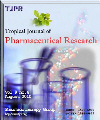
|
Tropical Journal of Pharmaceutical Research
Pharmacotherapy Group, Faculty of Pharmacy, University of Benin, Benin City, Nigeria
ISSN: 1596-5996
EISSN: 1596-5996
Vol. 14, No. 4, 2015, pp. 619-625
|
 Bioline Code: pr15081
Bioline Code: pr15081
Full paper language: English
Document type: Research Article
Document available free of charge
|
|
|
Tropical Journal of Pharmaceutical Research, Vol. 14, No. 4, 2015, pp. 619-625
| en |
Anticancer Activity of Linalool Terpenoid: Apoptosis Induction and Cell Cycle Arrest in Prostate Cancer Cells
Sun, Xiu-Bin; Wang, Shao-Mei; Li, Tao & Yang, Yong-qing
Abstract
Purpose: To evaluate the anticancer activity of linalool against human prostate cancer (DU145) cells.
Methods: The anticancer activity of linalool against DU145 cancer cells was evaluated by 3-(4, 5-
dimethylthiazol-2-yl)-2, 5-diphenyltetrazolium bromide (MTT) assay. Flow cytometry, using propidium
iodide and Annexin V-FITC, was applied to study apoptosis and cell cycle phase distribution. Inverted
light microscopy was used to study the effect of linalool on cell morphology and apoptotic body
formation in DU145 cells while gel electrophoresis was employed to evaluate the effect of linalool on
DNA fragmentation.
Results: Linalool induced a dose-dependent as well as time-dependent growth inhibitory effect on
DU145 prostate cancer cells. It induced sub-G1 phase growth arrest which led to increase in sub-G0/G1
cell population after treatment with increasing doses of linalool. DNA ladder appeared to be more
evident with increasing linalool concentration. However, no DNA fragments were observed in the control
groups. It was observed that 4.36, 11.54, 21.88 and 15.54 % of the cells underwent early apoptosis
after treatment with 0 (no linalool treatment), 20, 40, and 80 μM of linalool, respectively. Compared to
control cells, linalool treatment resulted in the appearance of cell shrinkage along with membrane
blebbing which are characteristic features of cell apoptosis.
Conclusion: The findings of this study indicate that linalool can be developed as a plant-based
chemotherapeutic agent against prostate cancer.
Keywords
Prostate cancer; Linalool; Chemotherapy; Cell cycle, Apoptosis; DNA fragmentation; Sub- G1 phase growth
|
| |
© Copyright 2015 - Tropical Journal of Pharmaceutical Research
Alternative site location: http://www.tjpr.org
|
|
